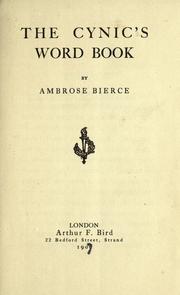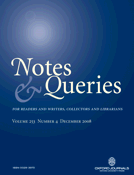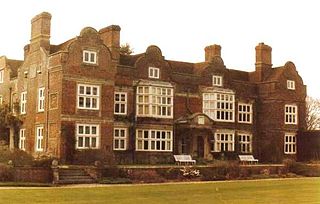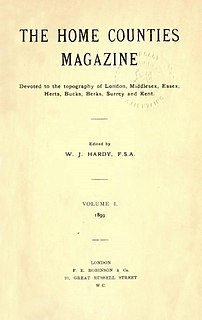Related Research Articles

New Scientist is a magazine covering all aspects of science and technology. Based in London, it publishes weekly English-language editions in the United Kingdom, the United States and Australia. An editorially separate organisation publishes a monthly Dutch-language edition. First published on 22 November 1956, New Scientist has been available in online form since 1996.

William Dean Howells was an American realist novelist, literary critic, and playwright, nicknamed "The Dean of American Letters". He was particularly known for his tenure as editor of The Atlantic Monthly, as well as for his own prolific writings, including the Christmas story "Christmas Every Day" and the novels The Rise of Silas Lapham and A Traveler from Altruria.

WatTyler was a leader of the 1381 Peasants' Revolt in England. He led a group of rebels from Canterbury to London to oppose the institution of a poll tax and to demand economic and social reforms. While the brief rebellion enjoyed early success, Tyler was killed by officers loyal to King Richard II during negotiations at Smithfield, London.

Hoodening, also spelled hodening and oodening, is a folk custom found in Kent, a county in south-eastern England. The tradition entails the use of a wooden hobby horse known as a hooden horse that is mounted on a pole and carried by an individual hidden under a sackcloth. Originally, the tradition was restricted to the area of East Kent, although in the twentieth century it spread into neighbouring West Kent. It represents a regional variation of a "hooded animal" tradition that appears in various forms throughout the British Isles.

Looking Backward: 2000–1887 is a utopian novel by Edward Bellamy, a journalist and writer from Chicopee Falls, Massachusetts; it was first published in 1888.

The Devil's Dictionary is a satirical dictionary written by American journalist Ambrose Bierce, consisting of common words followed by humorous and satirical definitions. The lexicon was written over three decades as a series of installments for magazines and newspapers. Bierce's witty definitions were imitated and plagiarized for years before he gathered them into books, first as The Cynic's Word Book in 1906 and then in a more complete version as The Devil's Dictionary in 1911.

Charles Harold St. John Hamilton was an English writer, specialising in writing long-running series of stories for weekly magazines about recurrent casts of characters, his most frequent and famous genre being boys' public school stories, though he also dealt with other genres. He used a variety of pen-names, generally using a different name for each set of characters he wrote about, the most famous being Frank Richards for the Greyfriars School stories. Other important pen-names included Martin Clifford, Owen Conquest and Ralph Redway. He also wrote hundreds of stories under his real name such as the Ken King stories for The Modern Boy.

Notes and Queries, also styled Notes & Queries, is a long-running quarterly scholarly journal that publishes short articles related to "English language and literature, lexicography, history, and scholarly antiquarianism". Its emphasis is on "the factual rather than the speculative". The journal has a long history, having been established in 1849 in London; it is now published by Oxford University Press.

Kent is a traditional county in South East England with long-established human occupation.

"I Feel Fine" is a song by the English rock band the Beatles that was released in November 1964 as the A-side of their eighth single. It was written by John Lennon and credited to the Lennon–McCartney partnership. The recording includes one of the earliest uses of guitar feedback in popular music.

Nominative determinism is the hypothesis that people tend to gravitate towards areas of work that fit their names. The term was first used in the magazine New Scientist in 1994, after the magazine's humorous "Feedback" column noted several studies carried out by researchers with remarkably fitting surnames. These included a book on polar explorations by Daniel Snowman and an article on urology by researchers named Splatt and Weedon. These and other examples led to light-hearted speculation that some sort of psychological effect was at work. Since the term appeared, nominative determinism has been an irregularly recurring topic in New Scientist, as readers continue to submit examples. Nominative determinism differs from the related concept aptronym, and its synonyms 'aptonym', 'namephreak', and 'Perfect Fit Last Name', in that it focuses on causality. 'Aptronym' merely means the name is fitting, without saying anything about why it has come to fit.

The Last Hero is the title of a thriller novel by Leslie Charteris that was first published in the United Kingdom in May 1930 by Hodder and Stoughton and in the United States in November 1930 by The Crime Club. The story initially appeared in The Thriller, a British magazine, in 1929. Because of this somewhat convoluted publishing history, The Last Hero is occasionally cited as the second volume of adventures featuring the crime-busting antihero Simon Templar, alias The Saint, predating Enter the Saint. In fact, according to Charteris himself, it was the third book of the series. This is supported by references to the events of Enter the Saint within the novel.
Kent county cricket teams have played matches since the early 18th century. The county's links to cricket go back further with Kent and Sussex generally accepted as the birthplace of the sport. It is widely believed that cricket was first played by children living on the Weald in Saxon or Norman times. The world's earliest known organised match was held in Kent c.1611 and the county has always been at the forefront of cricket's development through the growth of village cricket in the 17th century to representative matches in the 18th. A Kent team took part in the earliest known inter-county match, which was played on Dartford Brent in 1709. Several famous players and patrons were involved in Kent cricket from then until the creation of the first county club in 1842. Among them were William Bedle, Robert Colchin and the 3rd Duke of Dorset. Kent were generally regarded as the strongest county team in the first half of the 18th century and were always one of the main challengers to the dominance of Hambledon in the second half. County cricket ceased through the Napoleonic War and was resurrected in 1826 when Kent played Sussex. By the 1830s, Kent had again become the strongest county and remained so until mid-century.

Godinton House is a stately home in the parish of Great Chart, owned by a non-profit-making trust. It is 2 miles (3.2 km) north-west of the centreof the town of Ashford, Kent, UK.

George William Finch-Hatton, 10th Earl of Winchilsea, 5th Earl of Nottingham was an English politician known for duelling with the then Prime Minister, Arthur Wellesley, 1st Duke of Wellington.
William Mudford was a British writer, essayist, translator of literary works and journalist. He also wrote critical and philosophical essays and reviews. His 1829 novel The Five Nights of St. Albans: A Romance of the Sixteenth Century received a good review from John Gibson Lockhart, an achievement which was considered a rare distinction. Mudford also published short fictional stories which were featured in periodicals such as Blackwood's Edinburgh Magazine, Fraser's Magazine, and Bentley's Miscellany. His short story "The Iron Shroud", about an iron torture chamber which shrinks through mechanical action and eventually crushes the victim inside, was first published in August 1830 by Blackwood's Edinburgh Magazine, and later republished separately in 1839 and 1840 with the subtitle "Italian Revenge". Edgar Allan Poe is considered to have been influenced by "The Iron Shroud" when he wrote "The Pit and the Pendulum" having got his idea for the shrinking chamber from Mudford's story. Mudford was born in London, where his father made a living as a shopkeeper in Piccadilly. He was influenced by John Milton, Joseph Addison, Samuel Johnson, William Cowper, William Collins, Mark Akenside, Thomas Gray, and Oliver Goldsmith.
John Mathew Gutch (1776-1861) was an English journalist and historian.
Philip Twysden (1713–1752), was an Anglican clergyman who served in the Church of Ireland as Lord Bishop of Raphoe from 1747 to 1752. The circumstances of his death later became the subject of scandalous rumour.
Samuel Howell was a Quaker who became a prominent merchant in colonial Philadelphia and a leading patriot, proponent, leader and financier for American independence.

The Home Counties Magazine was a magazine of the "topography of London, Middlesex, Essex, Herts, Bucks, Berks, Surrey, and Kent", the home counties of England, that was published from 1899 to 1912. It incorporated Middlesex and Hertfordshire Notes and Queries.
References
- ↑ Feedback (2000). "Feedback". New Scientist.
Bibliography
- The Kentish Note Book: A half-yearly magazine of notes, queries, and replies on subjects connected with the County of Kent. Volume I (November, 1888 – December, 1890). [Reprinted with additions and corrections from The Gravesend and Dartford Reporter.] Paperback – 1891 by George O. Howell
- The Kentish Notebook: A Collection of Notes, Queries, and Replies on Subjects Connected with the County of Kent Volume II Hardcover – 1894 by George O. Howell. Publisher: Henry Gray